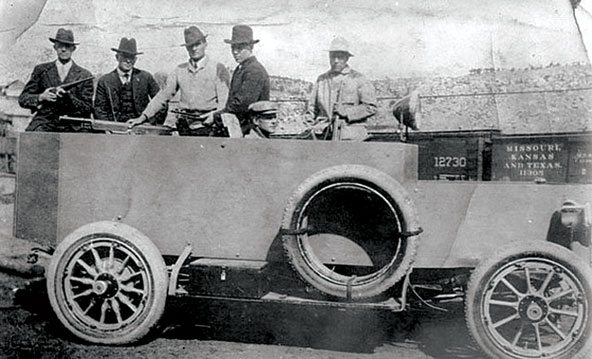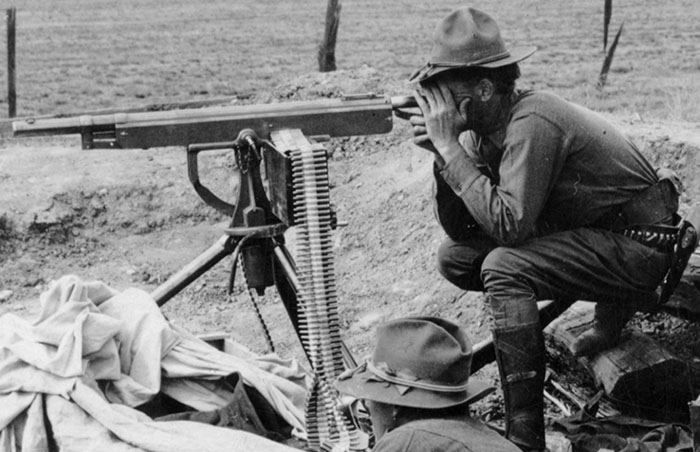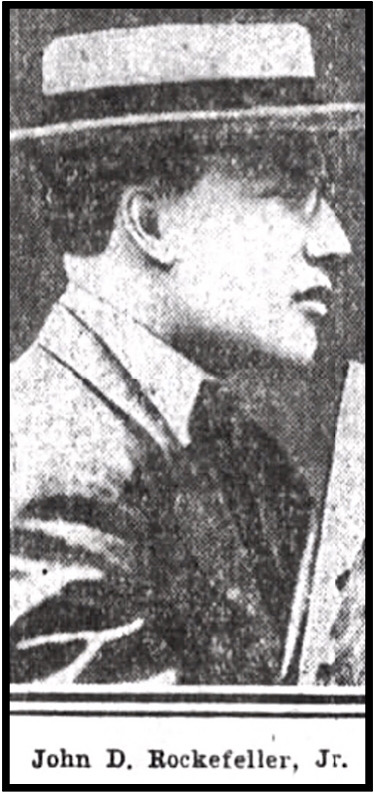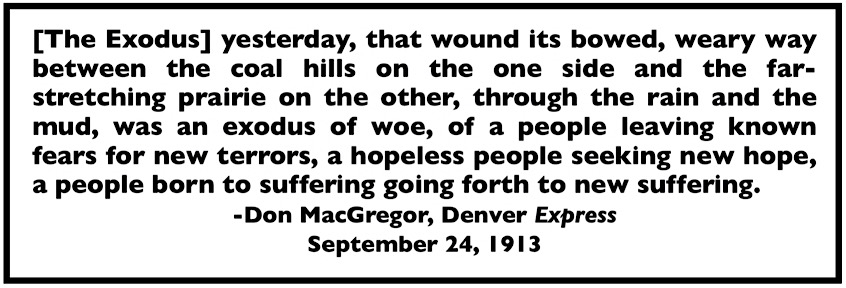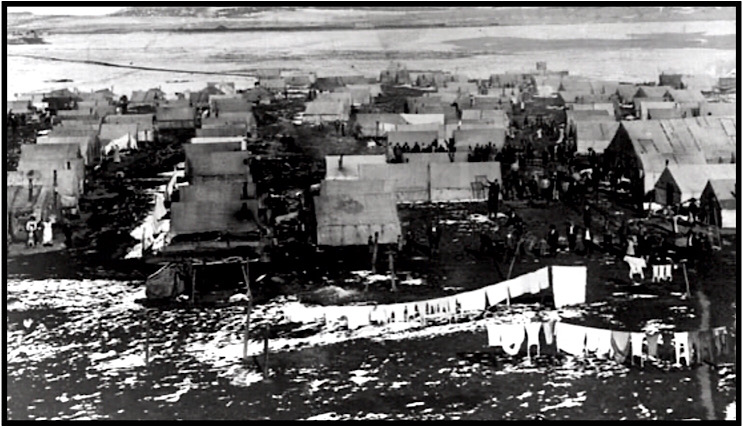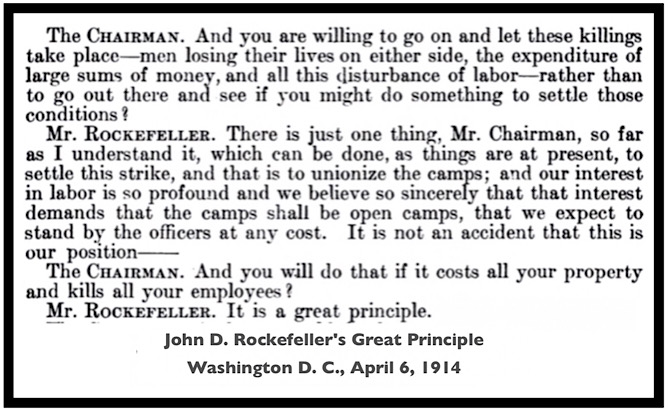 —————
—————
Hellraisers Journal – Sunday April 12, 1914
Washington D. C. – John D. Rockefeller Jr. Testifies Before House Committee
John D. Rockefeller Jr. made his appearance on Monday, April 6th, in Washington D. C., before the Subcommittee of the House Committee on Mines and Mining which is investigating conditions in the coal mines of Colorado. During his four hours of sworn testimony, Mr. Rockefeller stated that the “Open Shop” is a “Great Principle” worth the loss of all of his property in the state of Colorado and the lives of all of his employes.
During his four hours of sworn testimony, Mr. Rockefeller had this exchange with Chairman Foster:
The CHAIRMAN. Do you know about an automobile being armored-built of armor plate being built in your company?
Mr. ROCKEFELLER. It sounds interesting, but I have not heard of it.
The CHAIRMAN. It was built in the shops of the Colorado Fuel & Iron Co.
Mr. ROCKEFELLER. I did not know they produced automobiles as well.
The CHAIRMAN. They put on it machine guns, going around through that country.
Mr. ROCKEFELLER. I thought the idea referred to by Mr. Bowers, of having a number of searchlights was an excellent one, helping to prevent disorder. They could see the country all around.
The CHAIRMAN. Do you know this, that it was testified during the disturbances before the militia was called into the field, the mine guards were then in existence, and trouble took place between the striking miners and the mine guards or deputy sheriffs? Were you informed of that?
Mr. ROCKEFELLER. I did not know that was so, but it is usual where a strike occurs for the company to undertake to protect its men with the local officials, and add to that number before the the militia is called out. I think that is customary.
The CHAIRMAN. Now, then, when the militia was called out, a great many of these mine guards or deputy sheriffs, it was said, were sworn into the service of the State, and they were kept on the pay rolls of the company; for instance, the Colorado Fuel & Iron Co. What is your idea of that? Do you think that makes the militia a nonpartisan preserver of the peace?
Mr. ROCKEFELLER. I should simply say that if the local authorities in any community were unable to or did not render adequate protection to the workers of that district it was the duty of the employers of the labor to supplement that protection in any way they could.
The CHAIRMAN. Well, but if the militia had been called into the field and then the mine guards and deputy sheriffs who had been sworn into the militia were still on the pay roll of the company, drawing their pay from the State and from the company, too, is it your opinion that they would be a nonpartisan protector of the peace of the community?
Mr. ROCKEFELLER. Of course, that is a very extensive country. There are mines in many different places. I do not know that in any case the militia has been sent there in sufficient numbers to cover the entire country.[Photograph and emphasis added.]
MINE GUARDS ARMED AND STATIONED AS MILITIAMEN
The CHAIRMAN. You do not get my question, I think. The company’s guards—for instance, their old employees who had been with them for a long time-were disarmed, and also the miners were disarmed. But they immediately swore in the mine guards, the men who had been acting as mine guards, into the militia, and they were armed and stationed in that particular camp as militiamen instead of mine guards.
Mr. ROCKEFELLER. They could not have done that without the consent of those in authority over the militia.
The CHAIRMAN. That is said to be true. I am trying to get your opinion about that.
Mr. ROCKEFELLER. If that was the only way in which the governor could increase his force of militia to a sufficient extent, I assume it was an emergency measure which he sanctioned through his representatives, and the best thing that could possibly have been done.
The CHAIRMAN. So you think it was better to swear in the mine guards as part of the militia than it would have been to get them outside?
Mr. ROCKEFELLER. I would not undertake to form an opinion in that matter as against the opinion of the governor of the state. I presume that he acted in the way that seemed to him wisest and best. He knew the conditions.
The CHAIRMAN. I am trying to get your opinion. The militia is supposed, is it not, to be sent into the field to preserve the peace?
Mr. ROCKEFELLER. Yes.
The CHAIRMAN. And not to take part on either side?
Mr. ROCKEFELLER. Certainly.
The CHAIRMAN. Do you think that the swearing in of your guards and keeping them on the pay roll as militiamen helps to do that?
Mr. ROCKEFELLER. Without having been on the spot and knowing the situation it would be difficult to say whether that was the best thing to do or not.[Photograph and emphasis added.]
ROCKEFELLER HAS NOT BEEN TO COLORADO IN TEN YEARS
The CHAIRMAN. I see you are perfectly frank in answering questions that you can answer, but don’t you think that as a director and as the representative of a large interest in the Colorado Fuel & Iron CO. the reason that you are not prepared to answer a large part of these questions is because you have not personally investigated to find out the facts in the case, and that for 10 years you have not been in Colorado?
Mr. ROCKEFELLER. That is true; I have not been in Colorado for 10 years.
The CHAIRMAN. SO you really know nothing about it except what these men wrote you?
Mr. ROCKEFELLER. I keep posted through these officers.
The CHAIRMAN. And there has been no meeting of the directors of your company to personally look into this matter of a strike?
Mr. ROCKEFELLER. Of course, that I can not speak about, because I would not have known whether the notice came.
The CHAIRMAN. Do they ever have a meeting of the directors, without you knowing something about it?
Mr. ROCKEFELLER. They constantly do. They have their meetings right along. Whether it is a monthly meeting or whether the executive secretary acts in the interim I do not know. Now, we have the means of keeping in touch with the interests and of doing the things that we thought it were incumbent on us to do.
The CHAIRMAN. But still there has been a great industrial disturbance in which your company has paid out $250,000, bought guns and ammunition, and taken all that means to protect your property, and yet it has not been of sufficient importance to you for you to personally look into the matter?
Mr. ROCKEFELLER. It has been of such profound concern and importance to me that I have done the thing that seemed to me to be the very best way in which I could meet the situation and do my share in giving it the attention that it is incumbent upon me to give.[Photograph and emphasis added.]
ROCKEFELLER IS SURE THAT CONDITIONS ARE ENTIRELY SATISFACTORY
The CHAIRMAN. And all this disturbance and loss of life, killing upon both sides out there, has not been of enough importance to you to cause you to say, Let us have a meeting of the directors, and find out more about it?
Mr. ROCKEFELLER. I have been so greatly interested in the matter, and have such a warm sympathy for this very large number of men that work for us, that I should be the last one to surrender the liberty under which they have been working and the conditions which to them have been entirely satisfactory, to give up that liberty and accept dictation from those outside who have no interest in them or in the company.
The CHAIRMAN. But the killing of these people, the shooting of children, and all that that has been going on there for months has not been of enough importance to you for you to communicate with the other directors, and see if something might not be done to end that sort of thing?
Mr. ROCKEFELLER. We believe that the issue is not a local one in Colorado; it is a national issue, whether worker’s shall be allowed to work under such conditions as they may choose. And as part owners of the property, our interest in the laboring men in this country is so immense, so deep, so profound that we stand ready to lose every cent we put in that company rather than see the men we have employed thrown out of work and have imposed upon them conditions which are not of their seeking and which neither they nor we can see are in our interest.[Photograph and emphasis added.]
THE OPEN SHOP, ROCKEFELLER’S GREAT PRINCIPLE
The CHAIRMAN. And you are willing to go on and let these killings take place—men losing their lives on either side, the expenditure of large sums of money, and all this disturbance of labor—rather than to go out there and see if you might do something to settle those conditions?
Mr. ROCKEFELLER. There is just one thing, Mr. Chairman, so far as I understand it, which can be done, as things are at present, to settle this strike, and that is to unionize the camps; and our interest in labor is so profound and we believe so sincerely that that interest demands that the camps shall be open camps, that we expect to stand by the officers at any cost. It is not an accident that this is our position.
The CHAIRMAN. And you will do that if it costs all your property and kills all your employees?
Mr. ROCKEFELLER. It is a great principle.
The CHAIRMAN. And you would do that rather than recognize the right of men to collective bargaining? Is that what I understand?
Mr. ROCKEFELLER. No, sir. Rather than allow outside people to come in and interfere with employees who are thoroughly satisfied with their labor conditions—it was upon a similar principle that the War of the Revolution was carried on. It is a great national issue of the most vital kind.
The CHAIRMAN. And yet with all this disturbance, as you say, you have never taken the time personally, nor any of the directors, to find out for yourselves from personal knowledge whether these miners had any grievance or not?
Mr. ROCKEFELLER. Just the minute that I have the slightest lack of confidence in the man in charge–
The CHAIRMAN. I know; but you have not done that….[Photograph and emphasis added.]
~~~~~~~~~~~~~~~~~~~~~~~~~
SOURCES
Quote John D Rockefeller Jr, Great Principle, WDC Apr 6, 1914,
US House Com “Conditions in the Coal Miners of Colorado” p2874
https://babel.hathitrust.org/cgi/pt?id=msu.31293006718120&seq=858&q1=great+principle&start=1
Conditions in the Coal Mines of Colorado.
Hearings before a Subcommittee of the Committee on Mines and Mining
House of Representatives, Sixty-Third Congress, Second Session
Pursuant to H. Res. 387, a Resolution Authorizing and Directing
the Committee on Mines and Mining to Make an Investigation of
Conditions in the Coal Mines of Colorado.
Washington, DC, Government Printing Office, 1914
–Hearings of Feb. 9-April 23, 1914, Martin D. Foster, Chairman.
https://catalog.hathitrust.org/Record/011159608
-p2841-2916-Rockefeller Testimony, WDC, Apr 6, 1914
https://babel.hathitrust.org/cgi/pt?id=msu.31293006718120&seq=825
IMAGES
Baldwin Felts Thugs in Rockefeller’s Death Special
https://www.du.edu/ludlow/gallery2.html
CO Coalfield Strike, Rockefeller’s Gunthug Militia w Machine Gun, 1913-1914
https://www.du.edu/ludlow/gall2b.html
John D Rockefeller Jr, Brooklyn Daily Eagle p1, Apr 6, 1914
https://www.newspapers.com/image/685845264/
The Exodus from Coal Camps to Ludlow, Don MacGregor,
Denver Express, Sept 24, 1913 per Beshoar p63
https://books.google.com/books?id=JdEsnkIH43UC
Ludlow Tent Colony Before April 20, 1914
https://www.du.edu/ludlow/gallery1.html
See also:
Hellraisers Journal – Saturday April 11, 1914
Washington D. C. – John D. Rockefeller Jr. Testifies Before Federal Investigators, States He Is Willing to Lose All in Colorado, Including Lives of His Employes, in Pursuit of the “Great Principle” of Open Shop
Tag: Death Special (constructed at CF&I plant in Pueblo)
https://weneverforget.org/tag/death-special/
Tag: Colorado Fuel and Iron Company
https://weneverforget.org/tag/colorado-fuel-and-iron-company/
Tag: Colorado Coalfield Strike of 1913-1914
https://weneverforget.org/tag/colorado-coalfield-strike-of-1913-1914/
~~~~~~~~~~~~~~~~~~~~~~~~~
The Women and Children of Ludlow – Tom Breiding

